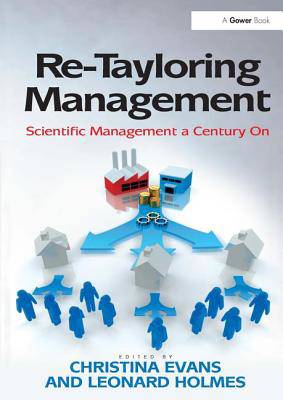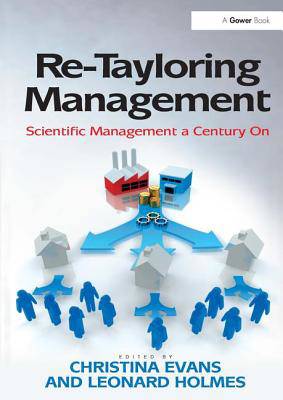
- Afhalen na 1 uur in een winkel met voorraad
- Gratis thuislevering in België vanaf € 30
- Ruim aanbod met 7 miljoen producten
- Afhalen na 1 uur in een winkel met voorraad
- Gratis thuislevering in België vanaf € 30
- Ruim aanbod met 7 miljoen producten
Zoeken
€ 182,45
+ 364 punten
Uitvoering
Omschrijving
Over a century has passed and yet there is growing evidence that knowledge workers across the globe today are as constrained by F.W. Taylor's much-maligned The Principles of Scientific Management, as factory workers were in the early twentieth century. Re-Tayloring Management looks critically at Taylor's philosophy on management and contrasts it with other perspectives that have since emerged, along with the professionalization of management and the growth in business and management education. The contributors demonstrate that despite the complexity and uncertainty that organizations face, instead of designing work systems where knowledge and service workers have the freedom to apply knowledge and skills at the point they are most needed, managers are obsessed with maintaining tighter control. This approach conflicts with contemporary job design principles, which emphasise 'job crafting', whereby individuals are encouraged to craft their role in a way that is congruent with their identity. Drawing on insights from academics with diverse backgrounds and interests, and organised around 'past', 'present' and 'future' themes, this book is a thought-provoking read for professional managers, as well as for postgraduate students and academics teaching and researching organizational studies and management.
Specificaties
Betrokkenen
- Auteur(s):
- Uitgeverij:
Inhoud
- Aantal bladzijden:
- 224
- Taal:
- Engels
Eigenschappen
- Productcode (EAN):
- 9781409450757
- Verschijningsdatum:
- 23/05/2013
- Uitvoering:
- Hardcover
- Formaat:
- Genaaid
- Afmetingen:
- 175 mm x 246 mm
- Gewicht:
- 611 g

Alleen bij Standaard Boekhandel
+ 364 punten op je klantenkaart van Standaard Boekhandel
Beoordelingen
We publiceren alleen reviews die voldoen aan de voorwaarden voor reviews. Bekijk onze voorwaarden voor reviews.











